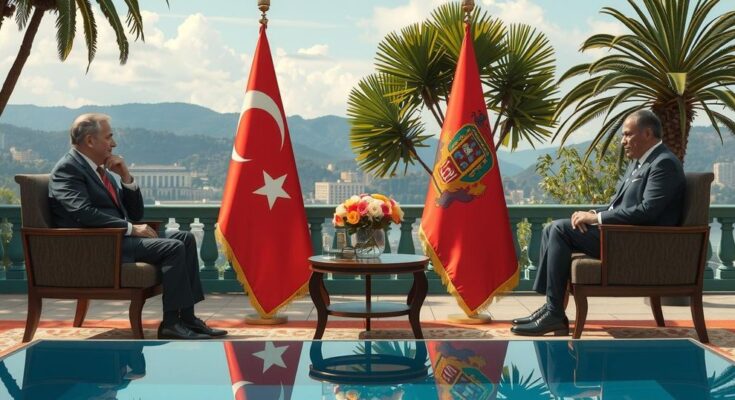Turkish Foreign Minister Hakan Fidan met Syrian leader Ahmed al-Sharaa in Damascus, focusing on support for Syria’s new administration after the fall of Bashar al-Assad. This marks a significant step in Turkey’s ongoing diplomatic efforts to influence Syria’s future. Amidst escalating tensions in northeast Syria, Turkey is also addressing its military actions against Kurdish forces while facilitating discussions for a new Syrian state structure.
In a significant diplomatic gesture, Turkish Foreign Minister Hakan Fidan held discussions with Ahmed al-Sharaa, the de facto leader of Syria, in Damascus. This meeting aimed at orchestrating support for Syria’s new administration following the recent fall of Bashar al-Assad. The Turkish Foreign Ministry confirmed this encounter but refrained from elaborating on the specifics of their discussions. Notably, this meeting follows Turkish President Tayyip Erdogan’s announcement of Turkey’s commitment to assist Syria in establishing a new state structure, which includes the drafting of a new constitution.
The backdrop to these discussions encompasses Turkey’s longstanding involvement in the Syrian civil conflict, where it supported opposition forces aiming to depose Assad. With Assad’s regime weakened after thirteen years of civil strife, Turkey is optimistic about facilitating the return of millions of Syrian refugees currently residing in Turkey. Reports indicate that Ibrahim Kalin, head of Turkey’s intelligence agency MIT, visited Damascus earlier this month to engage in dialogues concerning the future leadership of Syria.
Compounding the complexities of the region, Turkey’s military actions against Kurdish factions in northern Syria have intensified, particularly against the YPG militia, which Turkey categorizes as a terrorist organization. As Ankara and its allies continue to conduct military operations along the northern border, the dynamics are shifting concerning the Kurdish forces, who have faced renewed pressure following Assad’s diminishment of power. With the Syrian Democratic Forces now facing threats, their ability to maintain prior territorial gains is under significant strain as new leadership emerges in Syria, which is perceived to be more amenable to Turkish objectives.
The Syrian conflict, which began over a decade ago, has seen Turkey playing an influential role, particularly supporting various rebel factions opposed to the Assad regime. With the recent shifts in power dynamics following Assad’s fall, Turkey’s foreign policy is adapting to stabilize the new governance in Syria. Turkey has hosted millions of Syrian refugees amid its involvement, seeking their reintegration into a restructured Syria post-conflict. The emergence of new leadership in Syria represents not only an opportunity for reconstruction but also poses challenges, particularly concerning the Kurdish population that has gained strength during the war and is viewed unfavorably by Ankara. Furthermore, the delicate situation calls for Turkey to navigate its relationships with both the Syrian government and Kurdish forces, as the potential for conflict remains high in the region. The ongoing negotiations reflect Turkey’s broader strategy to enhance its influence while pursuing stability at its borders.
The recent meeting between Turkey’s Foreign Minister Hakan Fidan and Syria’s leader Ahmed al-Sharaa signifies a critical diplomatic engagement aimed at reshaping Syria’s political landscape post-Assad. With Turkey’s investments in support and reconstruction, coupled with military operations against Kurdish militias, the situation in northeast Syria remains tenuous. These developments underscore the complexities of regional politics as Turkey endeavors to influence the new Syrian administration while managing its security concerns regarding Kurdish forces.
Original Source: www.hindustantimes.com




